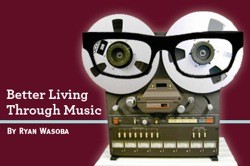Art and life co-habitate, informing, imitating, and enriching each other constantly. Each week in Better Living Through Music, RFT Music writer Ryan Wasoba explores this symbiotic relationship.
Earlier this week, I wrote a piece for RFT Music poking fun of the modern concept of genre that spawns phrases like "crunk-core" and "folktronica." I am not a dismissive type who scoffs at the idea of genre. I do find the organizational advantage handy, mostly when dealing with broad terms like "jazz" or "rock." But we can widen the scope and divide music into two categories: "words music" and "music music."
This is not a categorization of instrumental versus vocal. This is a division of the music makers' and listeners' priorities, and it might be the biggest line in the sand of music as a whole. A band who writes instrumental parts and throws vocals on after the fact makes "music music." A singer-songwriter who types a page of lyrics and applies chords later makes "words music." Somebody who tends to focus on a song's beat or drool over a bitchin' guitar solo likely prefers "music music" while somebody (ie. my grandfather) who frequently complains about not being able to understand a singer's vocals probably likes "words music."
There is no hard, fast rule on what makes a certain artist or piece of work or enthusiast qualify for one category over the other. "Music music" is anything with indecipherable lyrics, like hardcore or metal, or jam bands and prog rockers who use vocals as placeholders. Most performers who go under their own name or a singular stage name (Presley, Costello, even people who aren't named Elvis) usually play "words music," as do bands whose arrangements serve as the plates for the lyrical content rather than present themselves as the main course (see: the Hold Steady). Hip-hop can toe the line, but is generally "words music," which is a great argument against the ignoramuses who claim rap music is an oxymoron.
Perhaps the most helpful function of this priority division is that it tackles the tricky subject of pop music versus rock music more accurately than the misguided guitars=rock theorem. Simply put, pop music is "words music," even if the words are awful. Rock music is "music music" even if the music is terrible. Green Day, for example, has all the sonic elements of rock music, but the band plays "words music." If the band played "music music," it would be more apt to go over thirty seconds without singing and it probably wouldn't have re-written "Boulevard Of Broken Dreams" and named it "21 Guns." Radiohead is one of the most popular bands in the world, but Thom Yorke's voice is usually heard as another instrument in the band's arrangements, henceforth making the group purveyors of "music music."
Understanding the separation puts some aspects of music enjoyment into focus. When a band makes a big stylistic leap, fans are often hurt, even betrayed. This is often because the band's priorities have changed from music to words or vice versa. Hell, Weezer lost diehards with 2001's Green Album even though the band barely changed sonically; the difference was the lack of "music music" moments, like the lengthy instrumental passages of "Only In Dreams" and "Undone (The Sweater Song)" or solos that weren't just echoes of the vocal melody.
The more we care about music, the more we tend to quibble. Shit, just look at the comments section of any RFT Music post about local bands to see how opinionated and impassioned St. Louisans are about their music. Understanding where you exist in the words and music spectrum can help you relate to your fellow humans. We don't have to all listen to the same music to get along, but we do have to respect each other's priorities. "Music music" people and "words music" people coexisting is the first step to musical world peace.


